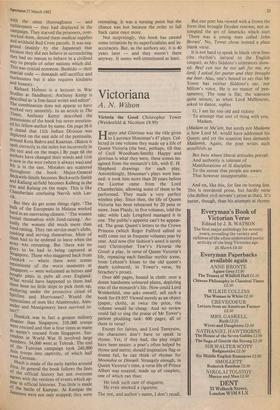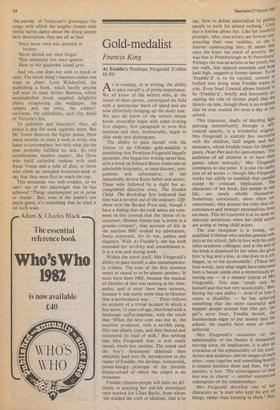Victoriana
A. N. Wilson
Victoria the Good Christopher Tower (Weidenfeld & Nicolson £9.95)
Happy and Glorious was the title given to Laurence Housman's 47 plays. Col- lected in one volume they made up a life of Queen Victoria (the best, perhaps, till that of Cecil Woodham-Smith). Happy and glorious is what they were, these scenes im- agined from the monarch's life, with E. H. Shepherd drawings for each play. Astonishingly, Housman's plays were ban- ned: it took him more than 20 years before the License came from the Lord Chamberlain, allowing some of them to be performed. They made a very perfect wireless play. Since then, the life of Queen Victoria has been rehearsed by 20 pens or more. Jean Plaidy, in five volumes, told the tale; while Lady Longford managed it in one. The public's appetite can't be appeas- ed. The great Queen's letters to the Crown Princess (which Roger Fulford edited so well) come out in frequent volumes year by year. And now (for fashion's word is surely out) Christopher Tow'r's Victoria the Good: a play, in verse of Queen Victoria's life, repeating each familiar mythic scene, from Lehzen's kisses to the old queen's death (coloured, in Tower's verse, by Strachey's prose).
Over 600 pages, bound in cloth: over a dozen handsome coloured plates, depicting eras of the monarch's life. How could Lord Weidenfeld, one asks oneself, sell such a book for £9.95? Viewed merely as an object (paper, cloth), at twice the price, the volume would be cheap. And no review could fail to sing the praise of Mr Tower's patient plodding task: 600 pages, all of them in verse!
Except for fairies, and Lord Tennyson, the characters don't have to speak in rhyme. Yet, if they had, the play might have been neater: a poet's often helped by rhyme and metre; should inspiration flag or drama fail, he can think of rhymes for Moonshie or Disraeli. Strangely enough, in Queen Victoria's time, a verse life of Prince Albert was essayed, made up of couplets, one of which ran thus:
He took such care of etiquette, He even smoked a cigarette.
The rest, and author's name, 1 don't recall. But our poet has viewed with a frown the form that brought Dryden renown; nor at- tempted the art of limericks which start `There was a young man called John Brown'. No, Tower chose instead a plain blank verse.
It is not hard to speak in blank verse lines (the rhythm's natural to the English tongue), as Mrs Siddons's utterances show- ed: Beef can not be too salt for me, my lord; 1 asked for porter and they brought me beer. Alas, one's bound to say that Mr Tower has neither Siddons's ear, nor Milton's voice. He is no master of pen- tameters. The tone is flat, the scansion quite unsure, as when Lord Melbourne, asked to dance, replies
0, I am far too old and rickety To attempt that sort of thing with you, Madam.
(Madam or Ma'am, but surely not Madame is how Lord M. would have addressed his Queen; and yet the scansion here demands Madame). Again, the poet writes such mouthfuls as
But here where liberal attitudes prevail And authority is tolerant of Manifestations of ill discipline To the extent that people are aware That however insupportable And on, like this, for line on boring line. This is reordered prose, but hardly verse (the dullest civil servant's prose at that). It's better, though, than his attempts at rhyme: the parody of Tennyson's grotesque; the songs with which the lengthy drama ends (while fairies dance about the dying queen) defy description, they are all so bad.
Since never once was spurned or broken Never denied nor once forgot That elemental vow once spoken Here in this gladsome island grot.
And yet, one does not wish to mock or carp. The whole thing's madness makes one want to cheer: Lord Weidenfeld, for publishing a book, which hardly anyone will want to read; Arthur Barbosa, whose accomplished brush supplied delightful plates recapturing the wallpaper, the carpets and the trees, the soldiers' uniforms, the tablecloths, each tiny detail of Victoria's life.
To publisher and illustrator, then, all praise is due for work superbly done. But Mr Tower deserves the higher praise. How many months or years it took to write, one hates to contemplate: but with what joy the poet probably fulfilled his task. Its very pointlessness inspires respect, like those who build cathedral replicas with used Swan Vestas and a tube of glue; or those who climb an unsealed mountain-peak to say that they were first to reach the top.
This mountain was well-trodden, so we can't say of this playwright that he has achieved 'Things unattempted yet in prose or rhyme'. But, even if the poem's not much good, it's something that he tried it on such scale.





































 Previous page
Previous page